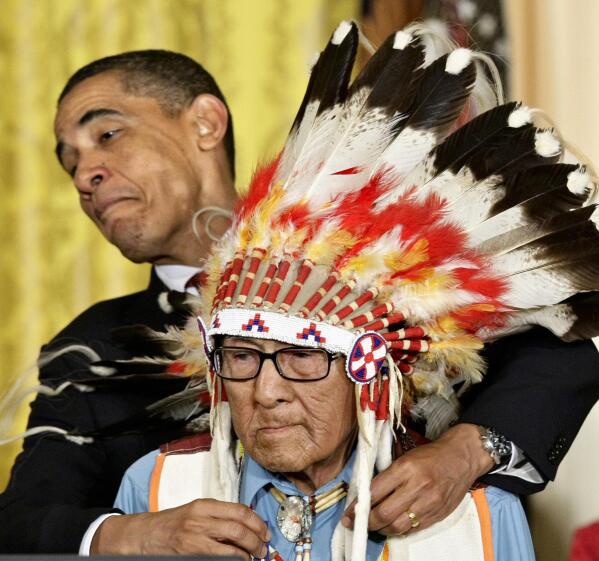USC to name building for tribal historian Joe Medicine Crow
USC to name building for tribal historian Joe Medicine Crow
LOS ANGELES (AP) — A University of Southern California building that had been named for a former president who was a eugenicist will be renamed for the late Joseph Medicine Crow, a USC graduate who became the tribal historian for the Apsáalooke (Crow) Nation and published influential works on Native American history and culture.
The Dr. Joseph Medicine Crow Center for International and Public Affairs will be dedicated in a ceremony in spring 2022. USC President Carol L. Folt also announced Thursday a scholarship program for Native American students in his name.
“This building serves as a crossroads for different cultures and communities from around the world, and it is a gathering place for our students,” Folt said. “We wanted to rename it for an individual who embodies the qualities we strive for at USC, and when we asked the university community to nominate people for this honor, the selection of this beloved and inspiring figure -- one of our most cherished alumni -- became clear.”
The landmark building, which has a distinctive tower topped by a globe, was previously named for Rufus von KleinSmid, who was USC’s president from 1921 to 1947. His name was stripped last year because of his support for California’s eugenics movement, which led to a 1909 state law that forced sterilization of people deemed “unfit.”
Medicine Crow, who died at age 102 in 2016, was raised by his grandparents in a log home on the Crow Indian Reservation in Montana, hearing stories during his childhood from direct participants in the Battle of Little Bighorn.
A member of the Whistling Water clan, his grandfather trained him to be a warrior.
He received an associate degree from Bacone College in Oklahoma, where he pitched on the baseball team, and then pursued as degree in sociology and psychology at Linfield College in Oregon.
Medicine Crow came to USC on scholarship in 1938 and earned a master’s degree in anthropology in 1939. His thesis was titled, “The Effects of European Culture Contacts Upon The Economic, Social and Religious Life of the Crow Indians.” His pursuit of a doctorate at USC was interrupted by World War II.
Serving in the U.S. Army, Medicine Crow completed the deeds necessary to earn the title of war chief, including stealing horses from an enemy encampment and engaging in hand-to-hand combat with a German soldier whose life Medicine Crow ultimately spared.
Upon his return from the war, Medicine Crow was designated tribal historian by the Crow Tribal Council, a position he filled for decades — all the while cataloging his people’s nomadic history by collecting firsthand accounts of pre-reservation life from fellow tribal members.
Medicine Crow received four honorary doctorates during his life and received the Presidential Medal of Freedom from President Barack Obama.


